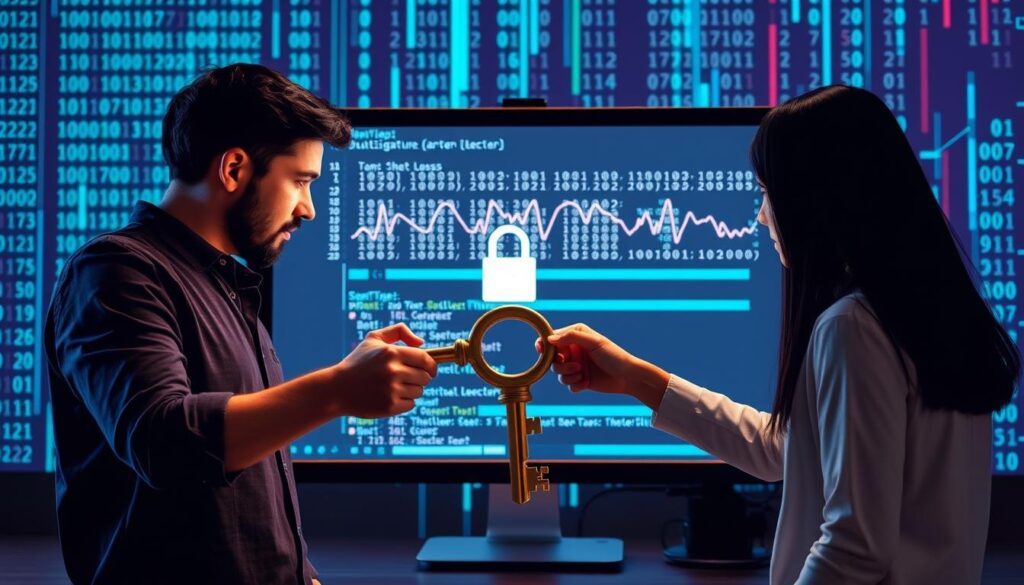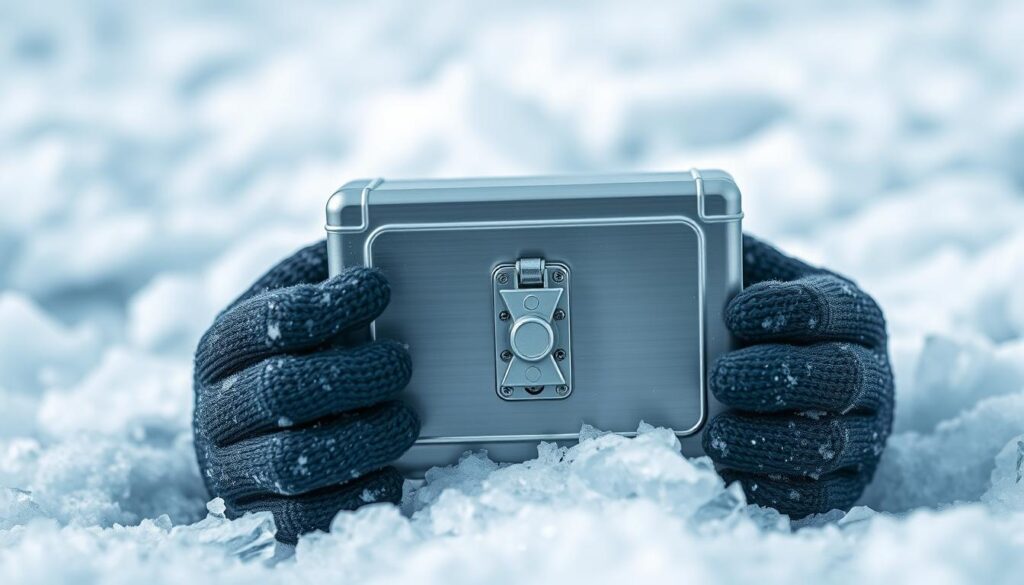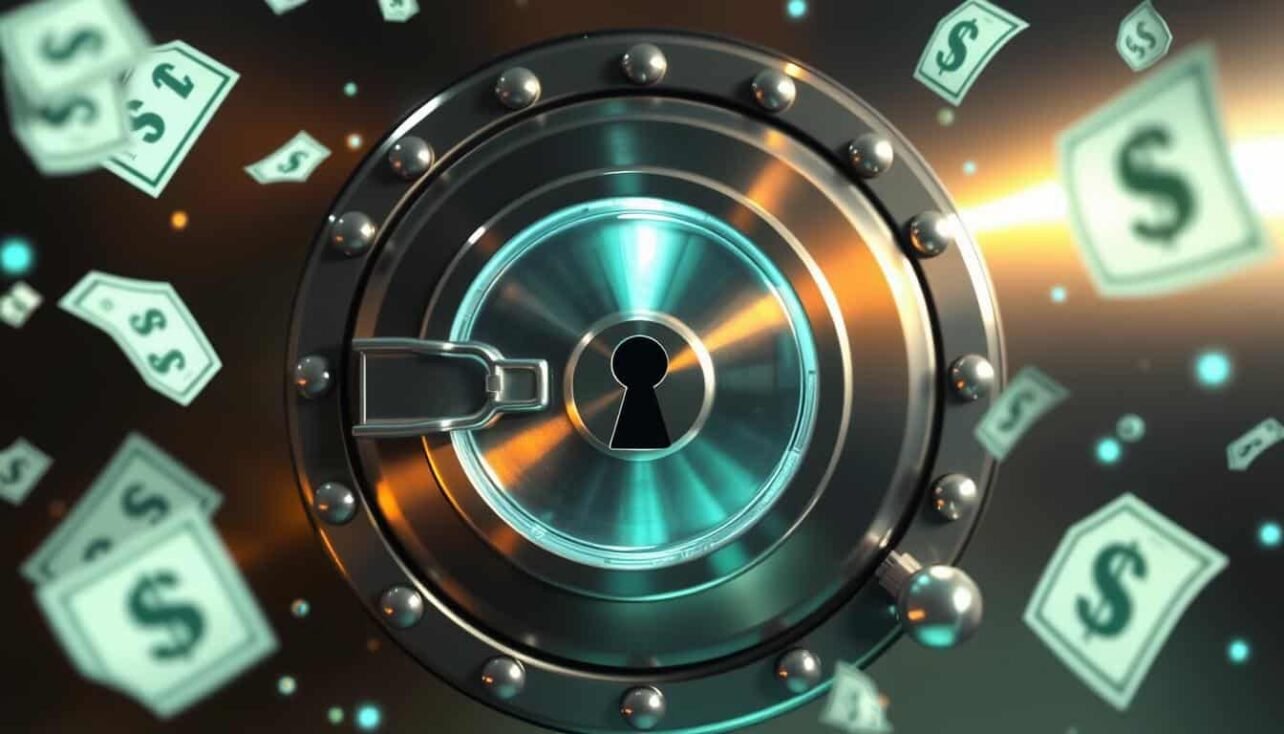In the world of cryptocurrencies, keeping your digital assets safe is key. This guide will help you set up a crypto wallet. You’ll learn the basics and see the different types of wallets and how to keep them safe. It’s perfect for beginners or those wanting to improve how they manage their digital assets.
Key Takeaways
- Understand the definition and importance of a crypto wallet for secure digital asset storage.
- Learn how to set up a crypto wallet and explore the different types, including hot wallets, cold wallets, and multi-signature wallets.
- Discover the crucial role of private and public keys in cryptocurrency transactions and the underlying cryptographic principles.
- Identify reputable wallet providers and assess their security features to ensure the safety of your digital assets.
- Explore advanced wallet options, such as mobile, desktop, and hardware wallets, and their respective advantages and drawbacks.
- Implement best practices for wallet management, including backup and recovery measures, to safeguard your crypto holdings.
- Understand the integration of crypto wallets with exchanges and the use of blockchain explorers for wallet monitoring.
What is a Crypto Wallet?
A crypto wallet is a digital tool that lets you store, send, and receive your digital assets safely. It acts as the bridge between you and the blockchain network. It takes care of your cryptocurrency with great attention.
Defining Digital Asset Storage
A crypto wallet is not just a place to keep your digital coins. It’s a complex system that protects your private keys and public keys. These keys let you access your funds and make secure transactions on the blockchain.
Importance of Secure Key Management
Keeping your keys safe is very important in the world of cryptocurrency. Your private keys are the keys to your digital assets. If someone gets them, they could steal your money. Crypto wallets help keep your cryptocurrency wallets safe, protecting your digital asset storage from threats.
“Cryptocurrencies are nothing without a secure way to store and manage them. Crypto wallets are the backbone of the digital asset ecosystem, enabling users to take control of their financial future.”
Learning about secure key management and the role of crypto wallets in protecting your digital assets is the first step to join the exciting world of cryptocurrency.
How to Set Up a Crypto Wallet
Setting up a crypto wallet is the first step in managing digital assets. It’s a secure place to keep your cryptocurrencies. You can send, receive, and track transactions easily. Let’s go through the steps to set up a crypto wallet.
First, pick a trusted wallet provider. Look at different wallets, thinking about security, ease of use, and which cryptocurrencies they support. You can choose from software wallets, hardware wallets, or mobile wallets, each with its own benefits.
- After picking a wallet provider, download the app or software to your device.
- Follow the instructions on the screen to make a new wallet. You’ll need a unique address and private keys to access your digital assets.
- Keep your private keys safe, like in a password manager or a hardware wallet. These are the only way to get to your money, so keep them safe.
- Put money into your wallet by moving it from an exchange or another wallet. Make sure you enter the right address to send the money.
- Use extra security features your wallet offers, like two-factor authentication or multi-signature access, to protect your crypto.
Your crypto wallet’s security is very important. Back up your wallet, keep your private keys safe, and watch out for any suspicious activity or threats.
| Key Steps to Set Up a Crypto Wallet |
|---|
| 1. Choose a reputable wallet provider |
| 2. Download the wallet software or app |
| 3. Create a new wallet and generate private keys |
| 4. Securely store your private keys |
| 5. Fund your newly created wallet |
| 6. Set up additional security features |
By following these steps, you’re on your way to a secure crypto wallet and managing your digital assets well. Remember, keeping your private keys safe is key to a successful crypto journey.
Types of Crypto Wallets
Managing your digital assets means choosing from many crypto wallet options. Each has its own benefits and drawbacks. It’s important to know the different wallet types to find the best one for you.
Hot Wallets: Convenience vs. Security
Hot wallets are online wallets that let you easily access your money. They are great for people who use cryptocurrency a lot. But, being online makes them more at risk for hacking or unauthorized access.
Cold Wallets: Maximum Security
Cold wallets are offline and keep your private keys safe. They are the safest way to store your digital money. They might be harder to use for everyday transactions. But, they protect your cryptocurrencies from online threats.
Choosing between hot and cold wallets depends on what you value more: ease of use or security. Picking the right crypto wallet is a big decision. It affects how well your digital money is protected.
Understanding Private and Public Keys
At the core of cryptocurrency, we find two key concepts: private and public keys. These digital signatures are crucial for the security and ownership of digital assets.
Cryptographic Principles
Private keys are like a secret password for your cryptocurrency wallet. They let you manage, secure, and transfer your funds. Keeping your private keys safe is very important. If someone gets them, they could take control of your money.
Public keys, on the other hand, are made from your private keys. They’re used to get cryptocurrency payments. You can share your public keys without worrying about your wallet’s security.
The link between private and public keys comes from complex algorithms. These algorithms keep blockchain transactions safe. Knowing these principles helps you protect your digital assets and feel secure in the crypto world.
“Cryptocurrencies rely on a complex cryptographic system that utilizes private and public keys. Understanding these fundamental principles is essential for managing your digital assets and ensuring the security of your crypto wallet.”
Choosing a Reputable Wallet Provider
Choosing a cryptocurrency wallet is a big decision. It affects how safe and well you can manage your digital money. Here are some important things to think about when picking a good wallet provider:
- Security Measures: Check the provider’s security steps, like multi-factor authentication, encryption, and cold storage. Make sure they keep your private keys and money safe.
- User Reviews and Reputation: Do your homework on the wallet provider’s standing in the crypto world. Read what users say, look at forums, and check for any security issues or customer complaints.
- Transparency and Accountability: Find a provider that shares info about their work, team, and follows the rules. A good provider is open and answers to its users.
- Features and Functionality: Think about what the wallet offers, like support for many cryptocurrencies, being able to use it on your phone, and working with exchanges or other financial tools.
- Customer Support: See how good and quick the provider’s customer support is. Having reliable support is key for solving problems or questions you might have.
Choosing the right cryptocurrency wallet provider is key to keeping your digital money safe. Focus on security, good reputation, and easy-to-use features. This way, you’ll find a wallet provider that meets your needs and protects your crypto investments.
“When it comes to cryptocurrency, the wallet you choose can make all the difference in the security and accessibility of your digital assets.”
Multi-Signature Wallet Security
In the world of cryptocurrency, keeping digital assets safe is crucial. Multi-signature wallets are a key solution for better security.
Enhancing Protection with Multiple Signatures
Multi-signature wallets need more than one person to agree before a transaction happens. This is different from single-signature wallets, which only need one person’s okay. With multi-sig wallets, more than one private key must agree before a transaction goes through.
This method brings big benefits for multi-signature wallets and wallet security:
- Increased control: More people involved means less chance of unauthorized access.
- Shared responsibility: Spreading private keys among trusted people or groups means no single weak link.
- Improved security: Needing more signatures makes it harder for hackers to take over the wallet.
| Feature | Benefit |
|---|---|
| Multi-signature requirement | Makes it safer by needing more people to okay transactions |
| Shared responsibility | Spreads control and lowers the risk of one weak spot |
| Increased control | Gives users more say and control over their digital money |
Using multi-signature wallets helps users protect their digital money. It’s a way to fight against the dangers of having one person in charge of everything.

Mobile Wallet Options
In the fast-changing world of cryptocurrency, mobile wallets are becoming a top choice for keeping and managing digital money. They are perfect for people who are always on the move. These wallets offer a smooth interface and are very portable.
There are many mobile wallet options available for both iOS and Android. They keep cryptocurrencies safe and make transactions easy. Users can send, receive, and check their digital money easily.
- Many mobile wallets use biometric authentication like fingerprints or facial recognition for extra security.
- Some wallets work with popular payment apps. This lets users handle their money easily in one place.
- Advanced mobile wallets might offer staking. This lets users earn rewards by holding certain cryptocurrencies.
When picking a mobile wallet, think about its reputation, security, and the cryptocurrencies it supports. By looking at these things, users can find a wallet that meets their needs and improves their digital money experience.
“The rise of mobile wallets has changed how we use cryptocurrencies. Now, managing digital money is easy and friendly.”
Desktop Wallet Alternatives
Desktop wallets are becoming a top choice for managing digital assets, unlike mobile wallets. They offer a traditional way to handle your crypto, perfect for those who like the feel of a desktop setup. Choosing between local storage and online access is key when picking a desktop wallet.
Local Storage vs. Online Access
Desktop wallets with local storage give users full control and security. Your private keys stay on your computer, away from online threats. This is great for those who want to keep their assets safe and in their hands. But, you’ll need to back up and recover your data yourself.
Desktop wallets with online access let you store your funds in the cloud. This means you can use your money from any device, anywhere. It’s super convenient but comes with the risk of online attacks. So, picking a secure wallet provider is very important.
| Feature | Local Storage | Online Access |
|---|---|---|
| Security | High | Moderate |
| Accessibility | Limited to single device | Cross-device compatibility |
| Backup and Recovery | User responsibility | Provider-managed |
| Offline Access | Yes | No |
When choosing a desktop wallet, think about the security of local storage versus the ease of online access. Knowing the differences helps crypto fans pick the right option for their needs and comfort with risk.
Hardware Wallet: The Ultimate Cold Storage
For those into cryptocurrency, hardware wallets are the top choice for keeping your digital assets safe. These devices are known as “cold storage.” They provide top-notch security against cyber threats. This makes them the best way to protect your hardware wallets and cold storage.
Hardware wallets are physical devices that keep your private keys offline. This means your cryptocurrency is safe from the internet and online attacks. They are different from hot wallets, which are always connected to the internet. This keeps your private info away from the digital world, lowering the chance of hacking or unauthorized access.
- Offline storage: Hardware wallets store your private keys in a secure, offline place. This makes them hard to hack.
- Tamper-resistant design: These devices have advanced security features. They include secure elements and tamper-evident seals to stop physical tampering.
- Backup and recovery: Hardware wallets usually have backup and recovery options. This lets you easily get back your funds if they’re lost or damaged.
Using a hardware wallet means your cryptocurrency is safe with top-level security. It’s the best choice for those who put the safety of their digital assets first.
| Feature | Hardware Wallet | Hot Wallet |
|---|---|---|
| Storage Location | Offline (Cold Storage) | Online (Connected to the Internet) |
| Security | High (Tamper-resistant, Secure Elements) | Lower (Vulnerable to Online Attacks) |
| Convenience | Moderate (Requires Physical Device) | High (Accessible from Any Device) |
| Recovery Options | Backup and Recovery Features | Dependent on Service Provider |
The importance of secure hardware wallets and cold storage is growing as cryptocurrency evolves. By choosing a reliable hardware wallet, you protect your digital assets for the long term. This gives you peace of mind as you deal with the changing world of cryptocurrency.

Crypto Wallet Best Practices
Keeping your crypto wallet safe is key to protecting your digital money. As a user, it’s vital to follow certain steps. This ensures your wallet stays secure and you can get back your funds if something goes wrong.
Backup and Recovery Measures
Effective backup and recovery are crucial for your crypto wallet. Here are some best practices to keep your digital assets safe:
- Create regular backups of your wallet seed phrase or private keys. Keep these in a safe, offline spot, like a fireproof and waterproof box.
- Learn how to recover your wallet from a backup. Know the steps to restore it if needed.
- Check your backup and recovery process often. Make sure it works right and you can get to your money when you need to.
- Don’t keep your seed phrase or private keys online or on cloud services. This makes them more vulnerable to theft.
By doing these things, you’ll make your crypto wallet much safer and more reliable. This way, your digital money will be safe and ready for you when you need it.
Integrating Wallets with Exchanges
Cryptocurrency is getting more popular, so many users want to link their digital wallets with crypto exchanges. This link makes trading, depositing, and withdrawing digital assets easy and safe. It gives users a handy way to handle their crypto money.
To link a crypto wallet to an exchange, you need to do a few things:
- Create an account on the crypto exchange you want to use.
- Make a wallet address or pick one you already have to link to the exchange.
- Check the wallet address and finish the integration.
- Put crypto into the exchange wallet from your personal wallet.
Pick a crypto exchange that’s trusted and safe. Always make sure you’re sending crypto to the right place to avoid losing it forever.
| Crypto Exchange | Wallet Integration Features | Security Measures |
|---|---|---|
| Coinbase |
|
|
| Binance |
|
|
Linking your crypto wallet with a trusted exchange brings many benefits. You get more liquidity, trading chances, and a safe way to manage your digital money. This easy link is key to the crypto world, helping both new and seasoned crypto fans.
“Integrating your crypto wallet with an exchange is like having a secure gateway to the digital asset world, allowing you to explore new investment opportunities and manage your portfolio with confidence.”
Blockchain Explorers and Wallet Monitoring
In the world of cryptocurrency, blockchain explorers and wallet monitoring tools are key. They give you lots of info about your digital asset deals and what you own. This helps you understand and manage your money better.
A blockchain explorer lets you search the blockchain. You can see details of transactions, wallet addresses, and network actions. It gives you a clear look at the blockchain. This way, you can keep an eye on your cryptocurrencies and know how the blockchain is doing.
- Learn about your transaction history, like amounts, dates, and wallet addresses.
- Check if your cryptocurrency transfers are confirmed.
- See the big picture of the blockchain, like transaction volumes and block times.
Wallet monitoring tools are great too. They let you manage and watch your cryptocurrency in one place. You can:
- See your wallet balances and transactions all in one spot.
- Get alerts when you get or send funds, so you’re always in the loop.
- Look at how you spend and diversify your portfolio to make smart money choices.
Using blockchain explorers and wallet monitoring tools helps you understand your crypto better. It makes you safer and helps you make smarter choices about your digital money.

“Blockchain explorers and wallet monitoring tools are essential for any crypto enthusiast who wants to stay in control of their digital assets.”
Wallet Security Considerations
Keeping your crypto wallet safe is key in today’s digital world. You are the guardian of your digital money. It’s important to stop others from getting into your wallet. This part will talk about the main steps to keep your crypto safe.
Preventing Unauthorized Access
Stopping others from getting into your wallet is a big worry. Both hot and cold wallets can face threats like hacking, phishing, and theft. Here are some tips to help you stay safe:
- Enable multi-factor authentication (MFA) on your wallet for more security.
- Choose strong, unique passwords that aren’t used on other websites.
- Keep your private keys and recovery phrases safe, like in a hardware wallet or a fireproof safe.
- Update your software and firmware regularly to get the latest security updates.
- Be careful with messages or links from strangers that might be phishing attempts.
Following these steps can greatly lower the chance of someone else getting into your crypto wallet. This helps keep your digital money safe from threats.
| Security Feature | Description | Importance |
|---|---|---|
| Multi-Factor Authentication (MFA) | An extra security step that asks for another form of proof, like a code on your phone or a scan of your face. | High, it makes it much harder for others to get into your wallet. |
| Strong, Unique Passwords | Passwords that are hard to guess and not linked to other online accounts. | High, weak passwords can be easily found by hackers. |
| Secure Storage of Private Keys and Recovery Phrases | Keeping your private keys and recovery phrases in a safe place, like a hardware wallet or a fireproof safe. | Extremely high, these are the keys to your digital money. |
| Software and Firmware Updates | Updating your wallet software and firmware often to get the newest security fixes. | High, not updating can leave you open to attacks. |
| Vigilance Against Phishing Attempts | Being careful of messages or links from strangers that could be trying to steal your wallet info. | High, phishing is a common trick used by criminals to get your wallet details. |
By focusing on these wallet security tips and doing what’s best, you can make your crypto safer. This reduces the risk of unauthorized access.
Cross-Platform Wallet Compatibility
The need for wallet compatibility across different platforms is growing. With more digital devices and systems, users want to manage their multi-platform wallets from anywhere. This flexibility is key.
Having a wallet that works on many devices means you can easily get to your digital money. You can use it on your phone, tablet, or computer. This makes sure your money is safe and easy to reach, no matter what device you pick.
The Benefits of Cross-Platform Wallet Compatibility
- Increased convenience: Access your cryptocurrency holdings from any device, wherever you are.
- Enhanced security: Maintain the same level of security across all your devices, minimizing the risk of unauthorized access.
- Improved portfolio management: Manage your entire digital asset portfolio from a single, unified interface.
- Reduced friction: Eliminate the need to switch between multiple wallets or platforms to perform cryptocurrency transactions.
Using multi-platform wallets gives users the flexibility and smooth experience they want in the fast-changing world of cryptocurrency.
| Feature | Benefit |
|---|---|
| Cross-Platform Compatibility | Access your digital assets from any device, anytime, anywhere. |
| Unified Portfolio Management | Manage your entire cryptocurrency portfolio from a single interface. |
| Enhanced Security | Maintain the same level of security across all your devices and platforms. |
| Reduced Friction | Eliminate the need to switch between multiple wallets or platforms. |
By focusing on wallet compatibility and multi-platform wallets, users get a smooth and secure way to handle their digital money. This lets them manage their assets easily and with confidence.
Future of Crypto Wallets
The future of crypto wallets looks bright as the cryptocurrency world grows. Experts predict a big leap in wallet innovation. We’ll see better security and easier access for everyone. Multi-signature wallets are set to become more popular, making digital assets safer by needing more people to okay transactions.
Also, expect to see more advanced biometric authentication like fingerprints or facial scans in crypto wallets. This adds an extra security step for users. The future also holds the promise of wallets that work across different blockchains. This means users can handle many cryptocurrencies in one place, making managing digital assets easier.
As more people get into cryptocurrencies, the need for strong, easy-to-use wallets will grow. Wallet providers are getting ready to improve their services. They aim to give users secure, innovative, and flexible tools for managing their digital assets.
FAQ
What is a crypto wallet?
A crypto wallet is a digital tool that helps you store, send, and receive cryptocurrencies safely. It acts as a bridge between you and the blockchain network, handling your digital assets.
Why is secure key management important?
Keeping your cryptocurrency safe is key. Cryptocurrencies use complex cryptography with private and public keys. Knowing how these work is vital for protecting your digital assets.
What are the different types of crypto wallets?
There are various crypto wallets, each with pros and cons. Hot wallets connect to the internet and are handy but less secure. Cold wallets stay offline and are very secure but harder to use for many transactions.
How do I choose a reputable wallet provider?
Picking a good crypto wallet provider is important. Look for strong security, good reviews, and a solid reputation in the crypto world.
What is a multi-signature wallet?
Multi-signature wallets add an extra security layer by needing more than one approval for transactions. This makes it harder for unauthorized access, protecting your digital assets better.
What are the best practices for managing a crypto wallet?
Keeping your crypto wallet safe and sound is key. Use backups, recovery plans, and be alert for security risks.
How do I integrate my crypto wallet with an exchange?
Connecting your wallet to an exchange is common for trading and getting liquidity. Make sure to do it carefully for a smooth and secure link.
What are the security considerations for my crypto wallet?
Keeping your crypto wallet secure is critical. Use extra security steps, multi-factor authentication, and watch out for threats.
How can I ensure cross-platform compatibility for my crypto wallet?
As crypto grows, being able to use your wallet across different devices and platforms is important. Choose wallets that work well on various platforms to manage your assets easily from anywhere.
What is the future of crypto wallets?
Crypto wallets are changing fast, with new tech and improvements coming up. The future might bring better security, new ways to use wallets, and better ways to manage digital assets.


No comments yet